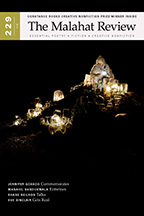Stephen Marche
"How the Children Stayed Beautiful in a Time of Many Catastrophes"
Among all the deaths, and the drifting and forgetfulness that followed the deaths, I understood every last degradation and nightmare, every crumb of collapse, except for the change that came over the children. I suppose the sense of measurement ending, the world’s clock’s winding down, moment to moment mattering less and less, gave to those summers the flavour of confused innocence for everybody. Meaning slipperied for the children, and for the rest of us.
There actually wasn’t a lot of nonsense. The warnings were clear. The plagues rumbled in just like they said they were going to. By the time of the third death, our two households, Dave and Leah, Stella and I, had a coherent strategy. Whenever I caught the first flickering rumours over the wires at The Star, Leah would check internal reports at Apotex for spikes in sales—in the case of the third death, Burma was the site of outbreak, I think—and then Dave drove the fully gassed-up, fully loaded Land Rover from his firm to the school for the kids and then to us and then to the highway to Georgian Bay, to their cottage among the islands two hours north of Toronto.
The drive up was spectacularly desolate. I had heard at the paper that the houses along the route made for fascinating profitable exploring if you weren’t afraid of a corpse or two. A few dubious, bragful reporters I know called it dead man’s spelunking. I don’t know. Who knows? Anyway the rapidity with which nature recovered the roadside was astonishing, the unattended shoulders lush with Indian paintbrush, maples sprouting through the cracked asphalt of abandoned gas stations, the wildlife that no longer hid in fear but sauntered out of the brush, bears and wolves and even cougars. That’s why there was so much depression after the second death, I think: knowing how much more beautiful and fuller and better the world was with twelve per cent of humanity oblivioned.
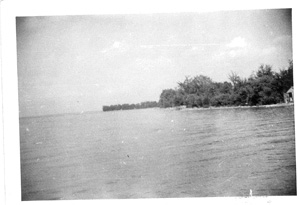
Our son Luke and Dave and Leah’s daughter Minnow probably remembered little about the plague two years earlier— they both had just turned four then—but the playground songs had become remarkably darker than in our own childhoods, like the one where the bodies of children rot off bit by bit in funnier and funnier ways and the other one about New York being swallowed by the sea, and who can guess the thoughts of children even in the best of times?
Just past Barrie, we stopped at Candlelight Burgers, where the pay phone was miraculously functional, even though everyone who worked there had died seven years earlier. Nobody but us stopped at Candlelight. Nobody could stand to remember how bustling the place had once been. The sadness of the place was its safety.
With a fistful of quarters from the glove compartment, Dave sauntered to the pay phone to confront all dread, personal and collective.
“Dad, where’s Dave going?” Luke asked.
“Quiet,” Stella and Leah said together, the car crinkled with tinsel
anxiety. All our eyes fixed on the miniature silent television show of
Dave’s J. Crew self thumbing quarters into the phone.
“Why do we have to be quiet?” Minnow asked. “There’s nobody
out here.”
“Your moms are just tense,” I said.
“Don’t worry them,” Stella whispered.
“I think telling them not to be worried might make them more worried,”
I whispered back.
“Just don’t.”
“Why should we be worried?” Luke asked.
I smoothed my hair with the easiest claw I could manage. “There’s
no reason to be worried, sweethearts. Minnow’s dad is just figuring
out how long our vacation’s going to be.”
“The plague,” Minnow whispered to Luke. The three adults in the
car pretended not to hear. Any wisdom out of our mouths would ooze
like rancid honey. In the hot silence beyond the window, Dave hung
up. He masked himself in one of the phoniest smiles I’ve ever seen—
it’s hard for a natural optimist to fake optimism—jauntily jaunting to
the car. “You kids ready for the best summer of your young lives?” he
bellowed.
Millions of people were dying elsewhere, we all knew.
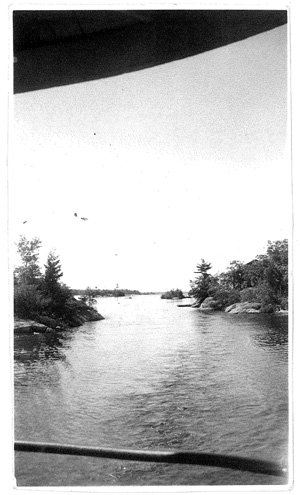
The big deaths brought strange transformations to everybody. I want to make that clear. After the first big death, the Koreas were just Korea. Nobody explained. Nobody held a ceremony or pulled down flags. It’s true there wasn’t much of North Korea left to stumble out of its caves, but still. No discussion. As if the Korean War had never happened. In Ontario, as elsewhere, the rise of ecological Islam was greeted without surprise. Suddenly, mosques were all run on solar power, and they wrote over their doorways, “And the earth We have spread out like a carpet.” Everybody just accepted the idea that Muhammad had been a kind of proto-member of the Sierra Club. The Canadian Nature Conservancy started using a quote from the Koran on its letterhead: “And do not seek to cause corruption in the earth. Allah does not love the corruptors.” Dave even dabbled a bit in the new Islam, I think. He often quoted The Earthquake, the sura everyone always made a big deal out of: “When the earth is shaken with a violent shaking, and the earth reveals what burdens her, and man says: ‘What has befallen her?’ on that day she shall tell her story.”
It’s not like the change made no sense, just as if sense had slipped a disc. And I think that’s what happened to the children. It was just more intense, starker, with the children.
At Honey Harbour, we filled every receptacle we could find with gasoline for the boat, left an iou on the counter of the ice-cream stand, said our hushed private goodbyes to the world, and then roared across Lake Huron in the Boston Whaler with the children laughing hilariously in the stern. The women looked as good as grapes and white wine. Stella with her blonde hair streaky with amber in the high-rushing air, and Leah like some rabbi’s wife utterly lapsed. No one is more gorgeous than a survivor. The glamour of endurance is absolute.
The plague made us giddy. Coursing through that savage paradise,
with its bent trees and exposed stone and rough readiness, we took
every breath as a mark of our magnificent fortune. Dave’s grandmother
had purchased twenty islands in 1921 for five dollars a piece,
and built two cottages on the largest with room to sleep ten, a tennis
court, and two docks. I suppose that Dave and Leah could have taken
their pick of friends up to the island. We had buried fifty ounces of
platinum at the place, and there were my years in the military, and we
could play tennis, but I think it was mostly the kids.
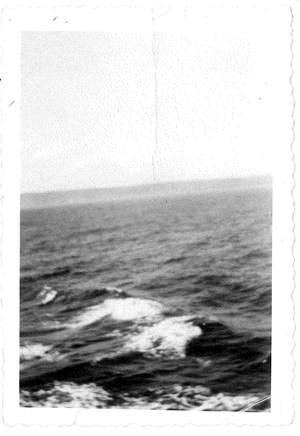
We loved each other’s kids. Luke was Luke, a real Luke too. Who wouldn’t love Luke? And Minnow used to invent these expressions, like I remember once she was drinking soda water, and she turned to me and said “this water’s sunburnt.” So during the second death we always called soda water sunburnt water. During the plagues, the humanity of metaphor was more than its ordinary salve; it amounted to fleeting salvation. That’s what Luke and Minnow knew from the beginning, from well before the change: everything is like something else.
“This year, proper lessons,” Leah said, during our first tentative game
after teasing the scruff of Queen Anne’s lace from the fractured tennis
court.
“How proper?” I asked, returning her serve way over the chainlink
fence that bordered the court.
“Proper enough that they know they’re having lessons.”
“Isn’t there any room for a summer vacation?” Dave asked. “I mean
I don’t think I learned anything at the summer cottage when I was a
kid.”
“You never learned anything anywhere,” Leah said.
“That is true.”
“I don’t mean nine to five, or nine to three, or whatever. I just mean
the mornings, a few little things.”
“Just reading,” I suggested, knocking a ball over.
“Adding and subtracting.”
“And a little geography,” Stella added.
Leah served. I returned lowly, flatly to Stella’s backhand, which she scrambled back in an overarching, flirtatious loop. Suddenly, we were rallying, hard-curling top spins and neat slices with that rare geometrical beauty that every now and then dignifies the ridiculousness of the game. Eventually Stella slammed the ball a few inches wide and I called it; the women, crooking their arms to their waists, looked unconvinced, either by my call or by me in general.
“With the best of intentions,” Dave announced from courtside,
where he was sucking back vermouth on ice, “it’s all going to turn
into story time.”
“Where are the children?” Leah wondered. “Have we lost them
already?”
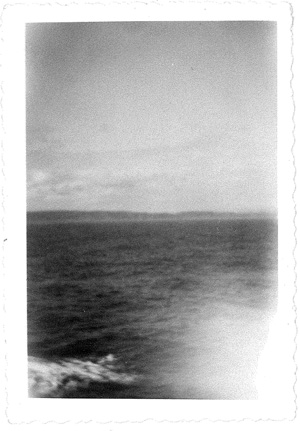
That first night. We tucked ourselves far, far away from the world and all its abattoirs and decline. Stella called our bed the drunken boat, and the phrase was just. We floated unintentionally. The dying being elsewhere was a kind of deliciousness, I don’t want to deny. We wrapped ourselves in our escape, in the harsh lushness of Georgian Bay, in the quilt of our separation. Love is gorgeous when everybody else is falling to pieces. That first night, our marriage was as safe as any marriage had ever been. The drift imperceptible.
The water of Georgian Bay is shallow enough that during droughts, if the level of the lake drops sufficiently, its stones scrape and wreck all the wealthy hulls. But the shallowness of the water increases its warmth. The whole bay becomes nearly tropical in August, a freshwater sea flecked by ancient stones and life that can only survive by holding on with every urge and guile in its possession. The pines rise in twisted conics to boluses of round needles, like green smoke puffed by a strong wind, suddenly frozen. It’s the kind of landscape that swallows you, that makes you want to be swallowed with its impenetrable reserve, its quiet disquietude, the lurking mystery of what it forever might reveal but chooses never to reveal.
Our isolation was our security. The island was tough to find even if you had charts, and we were so far out, so far beyond whatever lines had been drawn by the remote orderly fantasies of our fantastically optimistic ancestors, that any engine would have been heard from at least five kilometres away. We weren’t even careful. We lit fires whenever we liked. Why would anyone come for us? The scavengers had their pick of dead people’s stuff. I did keep an m-1 and a 40.10 and a couple of Winchesters, but mostly for the black bears that swam between islands with a rampant mastery they hadn’t known in ten thousand years. I tried to shoot them out of sight of the children and always cut out their tongues to eat. A bear’s tongue is too delicious to throw away even if you’re not hungry.
Less than a week after we arrived, Dave and I canoed to Stouffville—we canoed to avoid using gas, though the effort took all day—and the signal was already down. Another big death had come. The drift was beginning, already then. Days had no prefixes, no drive. Dave and I might spot a passing flock of ducks and try to hunt dinner, or the kids would rustle in the mud for the crayfish we would pretend to cook. Leah and Stella played cards and talked themselves into guffaws or bouts of tears and embraces. Sometimes Dave and I would remember that we were supposed to educate the kids, and out would come the atlas for a couple of hours, or the math-exercise books, or we would speak only in French for a half day or so. But Luke and Minnow would drift into more interesting conversations than the lessons we were trying to teach them and they always seemed to find the exact question we were afraid of. Why do people have different languages? Is math different in Africa? Does water ever disappear? They listened to old records on the Denon turntable, which I fixed up with a handcrank: Karajan conducting the Four Last Songs, the audio of The Aristocats, folk music of Armenia.
We thought about food. The taste of plague to me is brown trout with black truffles and ceps, followed by bonfire-marshmallow ice cream.
Thirty metres away from the main island was a small outcropping of
rock with a smattering of forlorn trees and a firepit, so we could swim
out for lunch and roast hotdogs or pan-fry fish (Lake Huron that year
was dense every morning with delicious brown lake trout whose flesh
had the delicacy of a thickened pink cloud). We called the other island
overturned island because we found an overturned turtle the first time
we reached it, and so it became the island of the overturned turtle and
then, for convenience, overturned island.
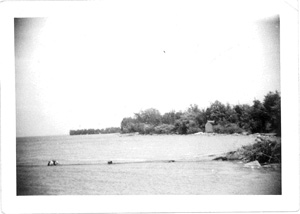
Dave made a deal with Luke and Minnow. If they could swim out to the overturned island he would tell them a scary story. Dave liked to tell horror stories about all the empty neighbouring islands, which were all either haunted by ghosts of ancient princesses and their various unfortunate lovers or lousy with shipwrecked pirate corpses. The children’s favourite, though, was the story of Mrs. Laurence’s body.
“That island belonged to Mrs. Laurence,” he would say, pointing to
the farthest island visible before the open.
“Who was Mrs. Laurence?” Minnow would ask in the sing-song of
asked and answered.
“Mrs. Laurence was a very old lady who lived by herself on that
island. And she was old enough that she needed a student to help her
in the summer, and so she hired a young man every summer. I’ll call
him George.” Dave paused melodramatically. “You’re not going to
tell your mothers I told you this story, right?”
The kids would start giggling around this point, nodding hyenically.
“George was bringing her a gin and tonic one afternoon like he
always did around three in the afternoon when she required a beverage
while she read her newspaper in the big Muskoka chair down by
the water. Know what he found?”
“What?” they asked together.
“Well, George found that Mrs. Laurence had died. She was
absolutely still. He checked her wrist. He checked her neck. He even
went back to the house and found a small mirror to check her breath.
Kids, she was dead. Dead as they come. Dead as a broken vase. Dead
as a picked-clean whalebone at the bottom of the ocean. Dead as
December.”
“What did George do?” Minnow asked, appalled and enraptured.
“Well, it’s not so much what George did as what George thought.
What do you think George thought?”
“How rude!” Luke shrieked.
“That’s right,” Dave smiled. “How rude of her to die so randomly.
Taking care of her was supposed to be George’s summer job. So then
he had an idea. And his idea was simple. Leave her. He’d been hired
for the summer, so he figured, leave her. He had been hired as the caretaker.
So he left her there.”
“What else did he do?” Luke asked through his fizzing delight.
“Well, poor George was out there. He was bored and then he was
hungry.”
“What did he do?” Minnow pressed.
“He ate her.” And then Dave would wrestle the kids and chew on
their limbs, nibbling his daughter’s forearm or Luke’s bum, praising
the chicken wing or the rump roast to me, while the children squealed
in delight at being consumed in jest. Then we would swim back to the
main island where the women sat flipping through age-old magazines
and mulling antique gossip, welcoming us back distractedly or with
some half-acerbic comment about the progress of our lessons.
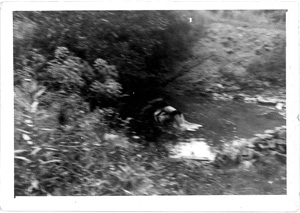
Maybe a month after
we arrived, the children
found Devil’s
Eye. I don’t know
where. We were eating
ribs and a little
cold macaroni salad
at the picnic table by
the water. Luke and
Minnow slipped
from the woods, Luke
carrying a large piece
of burnt driftwood, which he placed carefully between himself and
Minnow at the table. Stella objected. “Luke, honey. That’s disgusting.
Can you put your object, whatever it is, away while we eat?”
“That’s Devil’s Eye, Stella,” said Minnow. “That’s not an object.”
“What?” Leah asked.
“He’s our friend. His name’s not important. He needs to stay with
us. He won’t eat anything.”
The driftwood was almost entirely burned, charcoal with a gloss of
rainbow over its darkness.
“I suppose I can sort of see a face,” I said.
“Don’t be silly, Daddy. There’s no face,” Luke laughed.
“This is Devil’s Eye,” Minnow explained to me the way an impatient
nurse might explain porridge to an Alzheimer’s patient, and the
parents all laughed, and Devil’s Eye stayed at the table.
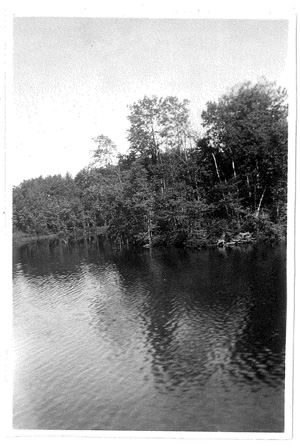
There may have been other reasons why we drifted, I mean reasons other than Devil’s Eye. Stella brought good drugs from Apotex, and the mixture of Percocet and pot cast profound maelstroms of calm over us. Was it the world drifting away rather than us? Everything grew elaborate, the meals especially; pine-needle pasta became a great favourite (Stella mixed the pine needles with molasses) and stuffed mallard with fried rice and juniper berries.
Two months in, Dave and I paddled into Stouffville again, on the off chance the world had righted itself. Dave steered up through a different labyrinth of islands than the route we usually took, and while I didn’t ask any questions, I thought it was funny because Stouffville was not anywhere near us and, even as relaxed as I was and even though Stella is a superb shot, I didn’t exactly want to leave the wives and the kids alone overnight.
“Where the hell are we, Dave?” I asked.
“I’ll show you, I’ll show you. Don’t worry. There’s nobody out here.
We have all Lake Huron to ourselves, I imagine.”
“You think?”
“We sure haven’t heard any motors.”
“But we’re in a canoe.”
He pointed with a rapier jab of a finger at a tumbledown cottage.
“That’s what I wanted to show you. The island.”
It was another tumbledown cottage on another overgrown island in our emptied-out country. He couldn’t believe I didn’t understand. “That’s Mrs. Laurence’s island,” he finally said. His story about the abandoned and consumed woman was apparently true. After the first plague, like many lawyers, he had crossed over to estate law, and Mrs. Laurence’s case had belonged to one of the partners. Mrs. Laurence had died. Mrs. Laurence had been eaten. There was no law under which to prosecute her caretaker because of the necessary revision under Bill 1C-62, for the disposition and handling of dead bodies.
At Stouffville, no contact. The phones were blank. We slept under the cover of evergreen branches against the cold, and I cursed Dave for his stupid digression. We didn’t arrive back at the island until the following afternoon. Stella was sitting out by the dock with the M-1, and she looked like she was just about ready to unload on us.
None of us were having sex either, which may have extrapolated our unrootedness, the drift. The world had been pretty clear that it didn’t want any more people. We were never horny. Never. Sometimes Dave and I would spend whole weeks together, fishing or hunting, and the women would retire to the privacy of their foraged teas. The children grew more removed. We each had only ourselves.
Dave and I were batting around balls in a useless afternoon where
the possibility that all meaning had fled from the universe was quite
real. Leah and Stella marched on court, furious in their maternal anxiety.
“We have to talk about the children.”
“Isn’t that all we talk about?” Dave replied, heading courtside to
towel his face.
“You know that thing they carry around with them?”
“Devil’s Eye,” I said.
“It talks to them,” Stella said.
Leah told the story. “We overheard them. In the shade by the dock.
Where the rocks are.”
“Looking toward the overturned island,” Stella interrupted.
“They were talking to their thing. They would put one bit in the
water and listen to the other end. And then talk about what they were
hearing.”
“What did old Devil’s Eye say?”
“Something about a woman named Mrs. Laurence,” Leah said.
“That’s just a story Dave’s been telling them,” I said before I
thought better of it. Dave glanced sourly in my direction. I shrugged.
Only the children had promised not to tell the mothers, not me.
“What kind of story?” Leah asked.
“A scary story.”
The women reeled theatrically while Dave rushed to defend himself.
“Telling scary stories to children at a cottage is natural. People
were doing it well before the plagues, and I just won’t accept that it’s
wrong. We’ve all got to relax out here. We’ve all got to calm down.”
“I agree,” I agreed.
“Kids have always been doing this stuff with their dads.”
“It’s true,” I added. “Luke and Minnow just have an imaginary
friend. Kids have always had imaginary friends. They make up their
own language. They were going to have imaginary friends whether
there was mass death or not. Kids make up their own secret weddings.
They live in a world apart. Don’t you remember?”
Leah hung a forlorn mother’s head. “What else are they doing that
we don’t know about?”
“We’re all on an island,” Dave said. “There’s nothing we don’t know. And that’s why we’re all over-parenting.”
The conversation spiraled down into more ordinary squabbles after
the word “over-parenting,” squabbles about who wasn’t doing dishes
and who played too much tennis and how the lessons weren’t going as
we had agreed they were supposed to go, and then we all had a drink
and took some pills and everything was fine again. Better than fine.
Everything was gorgeous again. We were spending eternal summer
on Georgian Bay.
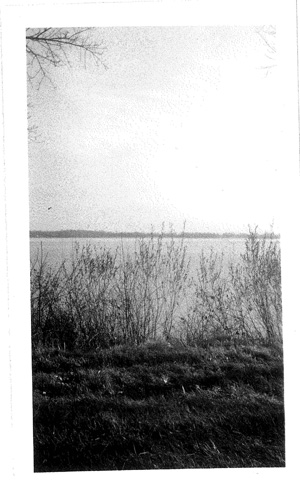
The children took to correcting our stories through the judgement of Devil’s Eye. So at dinner we would be informed that the young man who ate Mrs. Laurence was not a student but a hired gardener, or that the princess who had lived ten islands away had been twenty-one years old when she was murdered, not twenty-three, or that the world would be healthy again in two more months. The children understood perfectly, I think, how their descriptions of Devil’s Eye’s conversations worried their parents, exhausted us. Minnow took pleasure in her mother’s evident, trampolining horror. Luke was more reticent; as if he needed to tell us what Devil’s Eye said despite the anguish he knew it caused.
“What are we doing?” Leah asked one afternoon, after the children
slipped away carrying their little nightmare friend with them.
“We’re not doing anything, that’s the problem,” Stella said.
“It’s like a cult.”
“It’s not a cult,” I said. “It’s childhood. It’s the future.”
“What are we letting happen? Who are we repopulating the world
with?” Leah asked. “Who are we sending back to the catastrophe?
Why are we even trying? How can we even know what we’re doing to
them? Aren’t we in the middle of a grand simplification? Isn’t that
what I read? Why is everything so confused? Where are we drifting?”
We sat for a while in the gorgeous Ontario sunshine, which was glugging down through the aspens in dappled nonchalance, hilariously saccharine illumination confused, jumbled. Finally Dave spoke quietly, “You can only cultivate so much. They’ll have to be like us. They’ll have to travel through the dark with us.”
I assumed he was joking in that suddenly serious manner he played
with occasionally, but when I looked over, tears streamed down his
cheeks, glinting like the birdsong.
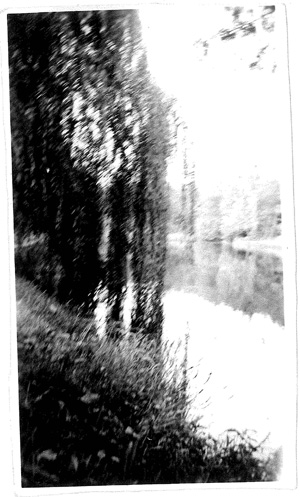
It must have been late in the summer. I remember my wife running out to find me. I was fishing on the back deck, and she ran out in alarm and terror, and I asked her what the matter was, and she couldn’t say anything. She led me by the hand to the back area where she had been tidying up the composter, and pointed at the pile she had been emptying. Inside, hundreds of peach pits. For some reason, peach pits don’t biodegrade, so there they were: The white pits of all the summers, of all the years before the plague. We just started weeping. And I don’t know why. A pile of what looked like round bones that time could not make fall apart.
I was woken by the sound of the women howling, stumbled the M-1 out of the closet, and hustled down the path between the cottages. Leah and Stella, their eyes swollen with terror and silence. “What is it? What’s wrong?” Leah was shocked by the sight of the weapon.
“The children are missing,” Dave said, and the moment he spoke Leah’s wailing ghosted out of her crumpling body in hysterical emptiness. The collapse of the whole species is nothing compared to the wildness of womb sorrow. “Look.” Dave pointed. He pointed behind us to the overturned island, where a fire was burning.
Slipping the canoe in the water, we paddled over, silently, just Dave and I. We had no expectations. Therefore we weren’t surprised. Luke and Minnow were sitting naked around a small fire in the pit. No need for cajoling or remonstrance. They took our hands and led us back to the canoe. Drifting across the water was like taking them back from marauders, from kidnapping slavemasters, from men without faces, from the undistinguishing death.
Halfway back, Dave asked, “You didn’t bring Devil’s Eye with
you?”
“We did,” Luke answered instantly, flatly. “We’ve left him back on the overturned island then,” Dave said.
“We burned him,” said Minnow. “He was our fire.”
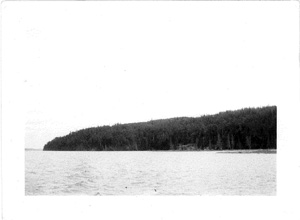
The next morning, five months after we had arrived, we heard the sound we had dreaded and craved the whole summer, the sound of jets. We all looked up, all of us—a tiny white line in the sky, the rainbow of our times, the scar tissue of the human race. The corrupting miracle of people moving from one place to another had recommenced. Dave and I didn’t even need to go to Stouffville. We caught a signal from near Mrs. Laurence’s island. The death was over.
The doctors were really precise. 7.29785 percent of humanity had died. In developed countries, the number was closer to three per cent, but the cities were still broken. Everything needed to be fixed, which meant plenty of jobs, plenty of opportunities. The tiger population started approaching twenty thousand again, I read. Our street was entirely fine. None of the kids from Luke and Minnow’s class had died, none of their parents either. Other kids from other schools had to be bussed in because the school board couldn’t keep the reduced classes open, which was an adjustment. Luke’s favourite Tae Kwon Do teacher had died and he cried for Master Kim. Still, the aftermath was mostly quite manageable. I had the lawn mowed and the garden ready for the winter in a weekend. Dave and Leah called the week after the return, but we didn’t call back for nearly a month. We’d seen enough of them for a while.
Read an interview with Stephen Marche about this story here.

